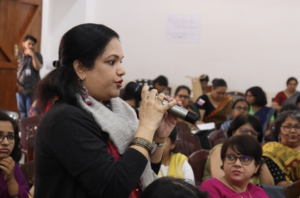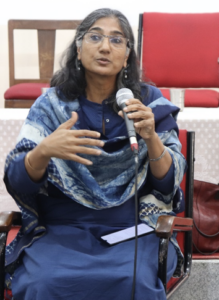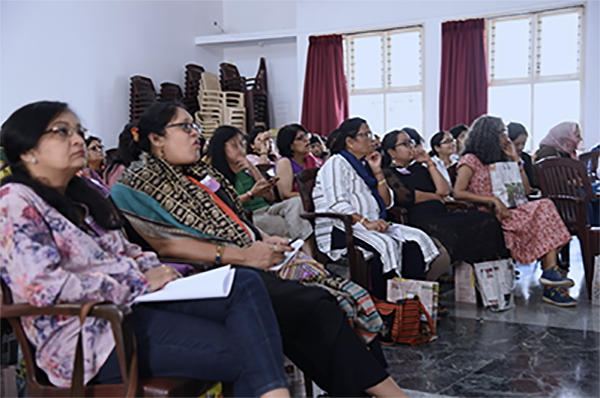DAY 2 : 08 February 2020
Sessions on Network Matters
Moving ahead on the Freelancers’ Initiative
Led by: Leena Reghunath, Vaishna Roy and Shubhada Chandrachud
Over the years, substantive thought and effort has been put in within the network to look into the rights, experiences and problems of freelance (or independent) journalists. Deficiencies and difficulties in payment have been among the major issues discussed.
 The huge difference between payments in the English and Indian language media has come up time and again during discussions. The situation has obviously not changed much. According to Shubhada Chandrachud, the writer seems to have no leeway to negotiate the terms of work and pay in the language media.
The huge difference between payments in the English and Indian language media has come up time and again during discussions. The situation has obviously not changed much. According to Shubhada Chandrachud, the writer seems to have no leeway to negotiate the terms of work and pay in the language media.
While the situation is particularly difficult for freelancers contributing to the regional language media, trying to make a living from freelancing is challenging irrespective of language. Concerns about payment are at the top of the list of problems that face freelancers, in terms of amounts as well as the long drawn out process often involved before dues are released.
All the panellists agreed that naming and shaming media organisations that renege on payments is not likely to be very helpful. In fact, going public with problems may only result in burning bridges.
The editors (and former editors) on the panel pointed out that the editor with whom the freelancer has interacted is often the person who is trying her or his best to get payments authorised and disbursed, even though they generally have little say in the way the organisation’s accounts department deals with payments. They suggested that it would be worth keeping this in mind while emailing editors about payments.
Vaishna Roy encouraged freelancers to send payment reminders to their editors so that they can follow up with the accounts department.
Those who occupy or have occupied the other side of the editorial desk also suggested that it is a good idea to try to clearly negotiate terms of work and pay. Whenever possible, put every mutually agreed term into an email and save it for the record. Always ask about the kill fee if the piece does not work out for reasons beyond the writer’s control, they said, because you are entitled to it. It is often difficult to ensure that a proper agreement, let alone a contract, is in place while commissioning every piece. That makes it all the more important that mutually agreed terms are recorded on email. That is a very important document to have, they said.
The discussion that followed included suggestions that the network, as a collective, should continue to bargain for fair and minimum pay, and timely payment – for example, within 30-45 days – for freelancers. It was also suggested that an important step that could be taken as a collective is to write to all major publishers/editors and appeal to their goodwill while demanding fair and timely compensation for freelance work.



 “We are trying to see how to develop a response system,” Shahina added. “Whatever happens, it is our responsibility and our burden. As individuals, we are left to fight cases for years. What can we do to ease the burden on individuals? The NWMI has intervened and helped at least a support system. Let us also discuss how to deal with legal issues, who to reach out to, etc.”
“We are trying to see how to develop a response system,” Shahina added. “Whatever happens, it is our responsibility and our burden. As individuals, we are left to fight cases for years. What can we do to ease the burden on individuals? The NWMI has intervened and helped at least a support system. Let us also discuss how to deal with legal issues, who to reach out to, etc.”